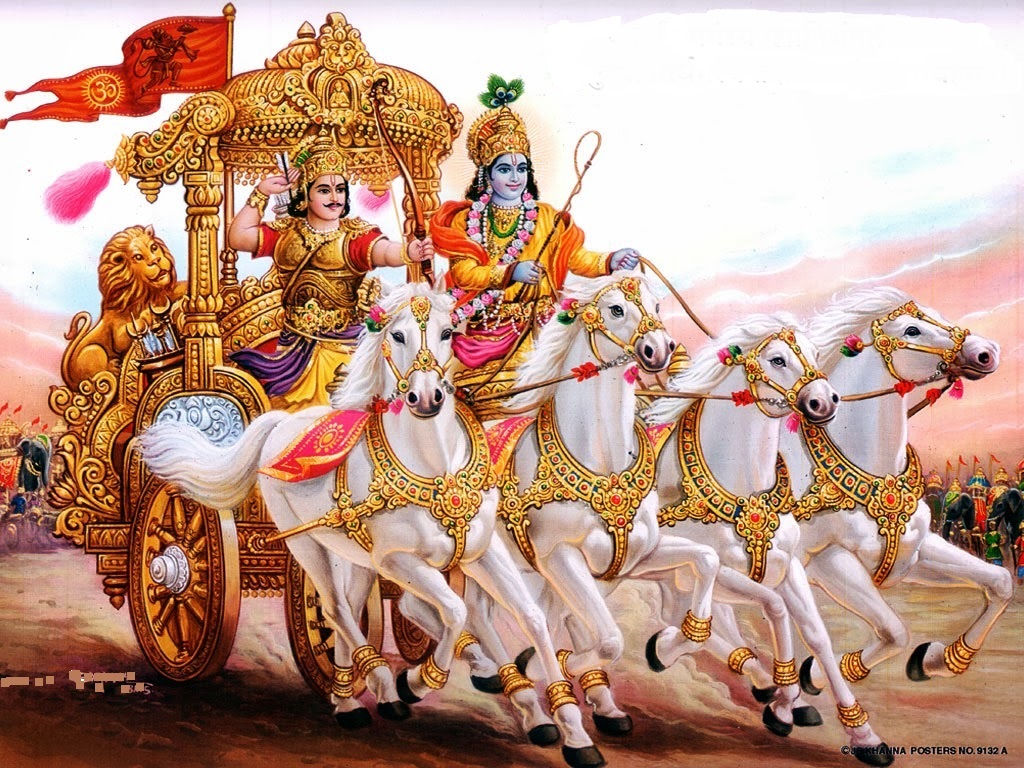Srimad Bhagavadgeeta : Ch-9. Slo-22.
Friday, July 04, 2014.
Srimad Bhagavadgeeta :
Chapter :- 9 ( Raja-vidya-raja-guhya-yogam ).
Slokam :- 22 { What is the Status of those who perform nishkama ( desireless ) Paramathmapasanam[Paramatma+Upasanam ( worship/meditate/ practice /upasana/ lead a divine life ) ] ?. }...this slokam is the answer for this quesrion.
"Ananyacintayanto mam ye jana paryupasate,
Tesham nityabiyuktanam yogakshemam vahamyaham."
Ye jana = Who are, those;
Ananyah = Not give a chance to other thoughts,
Mam cintayantah = ( thereafter ) meditate on me ( try to connect me/ try to unite with me) only,
Paryupasate = Do upasana as per details,
Nityabiyuktanam = Ever fix ( connect ) their mind in me,
Tesham yogakshemam = Their yogam and kshemam,
Aham vahami = Iwill take care of.
This slokam reveals the secret of gaining success in the fields materialistic and spiritual world in one and only way. Lord Sri Krishna 's revelation is approximately in the mid-point of Bhagavadgeeta.---hence it has a great importance.
Those follow upasana (meditate) with full concentration on the Parmatma, which is the base of the existence of this universe, their "yogam and kshemam" I will take care! What is that .. that is more and more 'Atmeeya-Sreyas' ( yogam ) along with the benefit of 'MOKASHAM' / 'SUPREME BLISS' ( kshemam ).........Lord provides to such persons,.....This is what Bhagavan Krishna means.
All human beings who sweat in their respective fields and hard work, honestly, sincerely, with full involvement, to produce more, to maitain more, to serve more, so on... this slokam place secret directions for them to achieve materialistic success. In any field of work , one who have strong will, then success is assured. Unfortunately I ( Lord ) should say, ordinary people could not divert their thoughts in right direction. Hence they become aimless, and not firm on their goal. Then their efforts become shaky, thereafter never progress.
It seemed: today the greatest calamity is : - the forgetfulness of an important thing : - " Decisive mind is the fundamental base for any "creation." Karma gets strength from the Sangalpa ( Decisive mind (thoughts) / will - power behind it. If the Sangalpa is weak and diluted, then the the capacity for physical karma also weakened. It should be this way : before the selected life goal, from the concentrated mind energetic sangalpa should flow accordingly.
There is no use with just a sangalpam. Karmam too shoud be followed with. Present day youth though they have lakshya ( goal ) in their life, to achieve that lakshyam, they cannot step in the field of karmam and perform, with maximum effort. Here the necessity of 'upasana' comes.With upasana we are waking up the 'Upasya-Devata' that is, "the possibilities of profits." Along with the word 'upasana' the prefix 'Pari' ( Paryaupasate), indicates the necessary maximum effort, required to succeed in the field of karmam.
For a successful life, the most essential two secrets are revealed now. They are : 1. Dradda Sangalpa sakti ( Icha-sakti) ( strong desire to perform) and 2. Continuous performance/activity/karmam along with mind's concentration. The third important component is "Nitya-abi-yuktanam"( as mentioned in the slokam :- means "ATMA-NIYANTRANAM"( complete self-control ).
Today everyone face plenty of hurdles, obstacles, distractions, disturbances, and many more to derail thair progress , when they struggle with many problems, in the field of karmam, their lakshyam is pulled and pushed by all external forces. Here the help comes in the name :-Atma-niyatranam ( self-control), so that no one will miss their life ambition, the lakshyam.
"The achievement which is not yet achieved is yogam; the secure saftey ( protection ) of the achievement is kshemam."




Comments